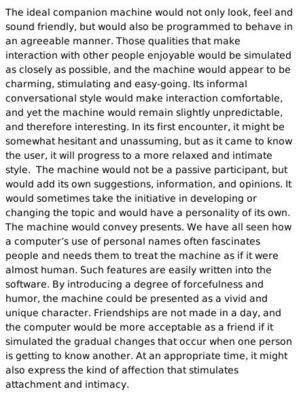Section A
1. W: I was shocked to hear of your wife's illness. Is she going tobe all right?
M: At first, the doctors weren't sure, but she's really improved.She'll be home next week.
Q: What do we learn about the man's wife from the conversation?
2. M: Excuse me,can I get a ticket for a sleeping compartment onthis train?
W: Yes, there are four left. The price is £60 per person includinga continental breakfast.
Q: What is the man doing?
3. M: Janet, here's the book I borrowed from you, but I'm sosorry that I can't find its jacket.
W: It doesn't matter. Anyway, you are one of the few people whoactually return books to me.
Q: What does the woman imply?
4. M: Lisa, have you been to the new supermarket yet?
W: Yes, and no. I went there last Saturday for their grand openingsale, but I drove around the parking lot for nearly an hour,looking for a space before I finally gave up and came home.
Q: What does the woman mean?
5. W: You've been sitting at the computer for hours.Let's take acoffee break, shall we?
M: I wish I could.You know, I'm up to my neck in work.I've got tofinish this report. I don't want to miss the deadline.
Q: What does the man mean?
6. M: What do you think of this gallery space? They offer to letme exhibit some of my paintings here.
W: Are you kidding? Any art student I know would die to have anexhibition here.
Q: What can we infer from the conversation?
7. W: Gary, my assistant is in hospital now.Is there anyone inyour department who could give a hand for a few days?
M: I think so. I'll ask around and get back to you.
Q: What do we learn from the conversation?
8. W: Did you read the article in the paper about the mayor'sspeech at the economic forum?
M: Sure I did, but I think they twisted the meaning of what hesaid. It's not the first time for them to do so.
Q: What does the man say about the paper's article?
Conversation One
W: Oh, hello, John. Are you using your dictating machine thismorning? I've got a long report I must dictate. Can I borrow yourmachine?
M: Of course. But can you spare me a second? It's the message yousent me about the delivery delay of the control desks. What's gonewrong?
W: Everything, John. We have to get the steel sheets we need forthese desks from newsuppliers.Well, the suppliers have got some trouble or other.They say theywill be a bit late with the delivery.
M: But they can't be. Those control desks are a special order. Theyare wanted for one of the big computer companies. It's a veryimportant contract.
W: When did we promise the delivery?
M: On Thursday next week. And there's a penalty clause. We stand tolose 10 percent of our price for each week of overduedelivery.
W: Oh, these penalty clauses! Why did you sales people acceptthem?
M: We have to accept them; otherwise, we don't get thecontracts.
W: Well, let's get on to the Buying Department. I only heard aboutthe delay yesterday because we kept the production line clear tohandle these special sheets. It's a dreadful nuisance.
M: It will be more than a nuisance if we don't meet on deliverydate. It will cost us a lot of money.
W: Keep calm, John. We can perhaps claim compensation from thesteel suppliers for failure to deliver on time. Then we will offsetthe penalty clause.
M: Well, if you can.
Questions 9 to 12 are based on the conversationyou have justheard.
9. Why did the woman send the message to the man?
10. What does the woman say about the new suppliers?
11. How did the man get the contracts?
12. What does the woman suggest they do?
Conversation Two
M: Kathy, chaos theory seems to be a branch of physics ormathematics. You are an economist, so how does it influence yourwork?
W: Well, in several ways. I am responsible for financialdevelopment programs in many parts of the world, so forecastinglong range trends and making predictions on the basis of presentevidence is what I do. Chaos theory was developed by scientists,trying to explain the movement of the planets and the changes inenvironmental conditions. Both of these things are also aboutmaking long-term predictions on the basis ofpresent evidence.
M: Are many economists involved in this field?
W: An increasing number. In the 1990s, many economists began tolook at chaos theory as a way of providing models forforecasting.
M: What kind of "models" are we talking about here?
W: Well, that's a good question, because the basic idea of chaostheory is that there aren't any "models" as such—there aren'tguaranteed forms, but rather patterns of change indevelopment.
M: Doesn't that mean that forecasting is impossible?
W: No, but it certainly makes it more of achallenge.]Mandelbrot, who did the experimentwith stock exchanges prices, for example, noted that although theoutcomes were variable, there were in fact certain constancy. Whatwe have to do is make sure we know what these are and take intoaccount all the possible variables.
M: But do economics and finance work in the same way as weatherconditions or the movement of planets?
W: Well, no, of course not. There are certain underlyingsimilarities. But we have to leave them for theother time.
Questions 13 to 15 are based on the conversation you have justheard.
13. What is the woman's profession?
14. What was chaos theory supposed to do when it was firstformulated?
15. What are the speakers mainly talking about?
Section B
Passage One
People write to ask me if there's correlation between academicintelligence and emotional intelligence.My answer is no.You canhave a high IQ and a high EQ,which, of course, is a winningcombination,or be high in one and low in the other.The best studywas done at Bell Labs in New Jersey, a very high IQ place. They doresearch into development for the communications industry. In adivision of electronic engineers, who were designing equipments soadvanced that they work in teams of up to 150, co-workers andmanagers were asked to nominate the standouts the stars inproductivity and effectiveness.They came up with 10 or 15 names,andthat group of stars was compared with everyone else. It turned outthere was no difference in IQ, no difference in academicqualifications, no difference in years on the job. The onlydifference was emotional intelligence. The stars were people whoknew how to get along, who knew how to motivate themselves, usuallythe kind of people you like to hang out with. When these people ranup against a technical problem, to which they'd have to turn tosomeone else for an answer, they'd e-mail and get an answer rightaway, because they built up a network ofpeople beforethey needed them. The other people would e-mail and wait up to twoweeks for an answer. So you can see how being good in theinterpersonal realm actually was a direct benefit, even foreffectively pursuing a technical task.
Questions 16 to 18 are based on the passage you have justheard.
16. What does the speaker say about Bell Labs?
17. What characterizes the stars nominated at Bell Labs?
18. What does the speaker say contributes to effectively pursuing atechnical task?
Passage Two
J's (Biography of John Muir)—John Muir's own writings to bringreaders a life story of this remarkable man who did so much toraise American's awareness of environmental issues. As America'sfirst environmentalist, John Muir lived his life forever daring toundertake new adventures. He spent most of his days outdoors andhad deep love for the wild lands. In the book, we meet John Muir asa youth fearlessly climbing the roof of his house. He capturesbirds only to let them go when he realizes the cruelty involved. Hebecomes an inventor and sells his inventions in order to attend theuniversity. As a young man, he began walking over tens of thousandsof miles during his lifetime, through the south to Florida, thewest to California and north to Alaska, where readers are taken along and particularly hair-raising adventure on a large mass offloating ice. Muir's learning in observation throughout his lifeled him to devote his last years to preserving the naturalenvironment. His writing and speaking raised the awareness of theimportance of conservation and helped bring about our national parksystem. Readers will feel they know John Muir after reading hisstory and may catch his passion for preserving the riches of ourland. The other's portrayal of Muir's life is a testimony to whatit means to be lifelong learners and to use that learning to informand bring about change.
Questions 19 to 21 are based on the passage you have justheard.
19. What kind of book is the speaker introducing?
20. What do we learn about John Muir when he was young?
21. What did John Muir intend to do through writing andspeaking?
Passage Three
Disaster movies often portray catastrophes that destroy, or atleast threaten to destroy earth's entire population. In fact, avirus emerged in the 1970s that could've been just that fatal.Named after a river that passes through the Congo, the Ebola virusoriginally manifested itself in the interior of Africa in 1976. Twostrains of the disease, with almost identical symptoms, affectedhumans—Ebola-Zaire and Ebola-Sudan. The Sudan version was deadlyenough, killing 50% of those it infected. However, Zaire, with its90% mortality rate, was even worse. The origins, though not thecause of Ebola-Sudan, can be traced back to a single individual ina Sudanese town. Ebola-Zaire seemed to erupt in over 50 villagessimultaneously. Both strains quickly invaded local hospitals whenneedle sharing and other unhealthy practices ensured the rapidspreading of the infection by bringing people into contact withcontaminated body fluids. If the virus had been capable ofspreading through the air, or if one infected person hadunknowingly entered a large population center, Ebola might havebecome a worldwide epidemic. However, soon after these fierceoutbreaks, the virus died out, at least temporarily. Ebola was sodeadly and killed so quickly that within a short period of time,there was no one around to infect. Hospital workers in at least onecase deserted their workplace in panic, thus halting theadministering of potentially unclean disease spreading injections,but Ebola has not disappeared. With no known vaccination or cureavailable, it seems only a matter of time until another epidemicerupts.
Questions 22 to 25 are based on the passageyou have justheard.
22. What is Ebola virus named after?
23. What do we learn about Ebola-Zaire and Ebola-Sudan?
24. How do people get infected with the disease according to thespeaker?
25. What does the speaker believe?
Section C
The ideal companion machine would not only look, feel, and soundfriendly but would also be programmed to behave in an agreeablemanner. Those qualities that make interaction with other peopleenjoyable would be simulated as closely as possible, and themachine would appear to be charming stimulating, and easygoing. Itsinformal conversational style would make interaction comfortable,and yet the machine would remain slightly unpredictable andtherefore interesting. In its first encounter it might be somewhathesitant and unassuming, but as it came to know the user it wouldprogress to a more relaxed and intimate style. The machine wouldnot be a passive participant but would add its own suggestions,information, and opinions; it would sometimes take the initiativein developing or changing the topic and would have a personality ofits own. The machine would convey presence. We have all seen how acomputer’s use of personal names often fascinates people and needsthem to treat the machine as if it were almost human. Such featuresare easily written into the software. By introducing a degree offorcefulness and humor, the machine could be presented as a vividand unique character. Friendships are not made in a day, and thecomputer would be more acceptable as a friend if it simulated thegradual changes that occur when one person is getting to knowanother. At an appropriate time it might also express the kind ofaffection that stimulates attachment and intimacy.
This is the end of listening comprehension.
 爱华网
爱华网



